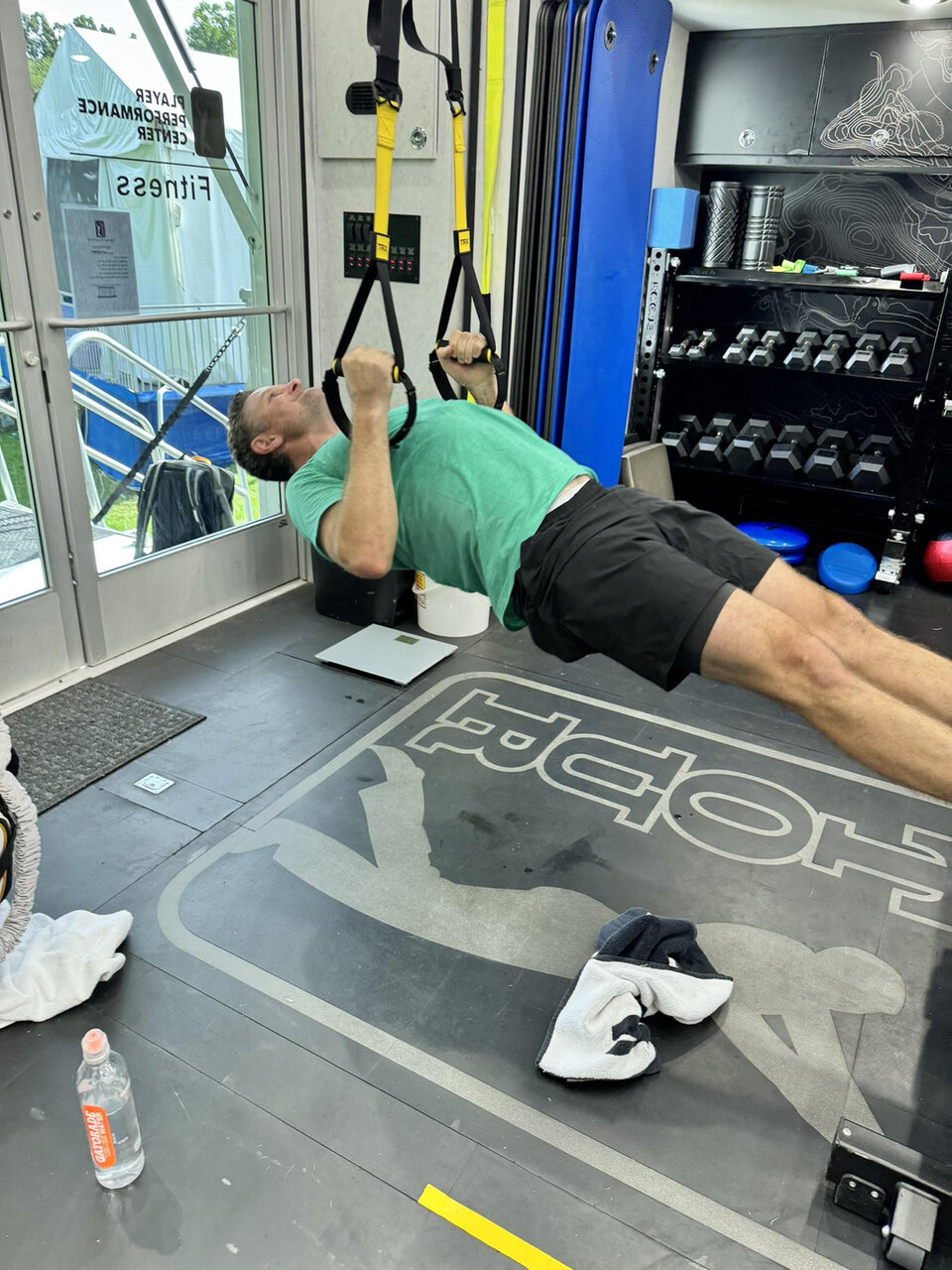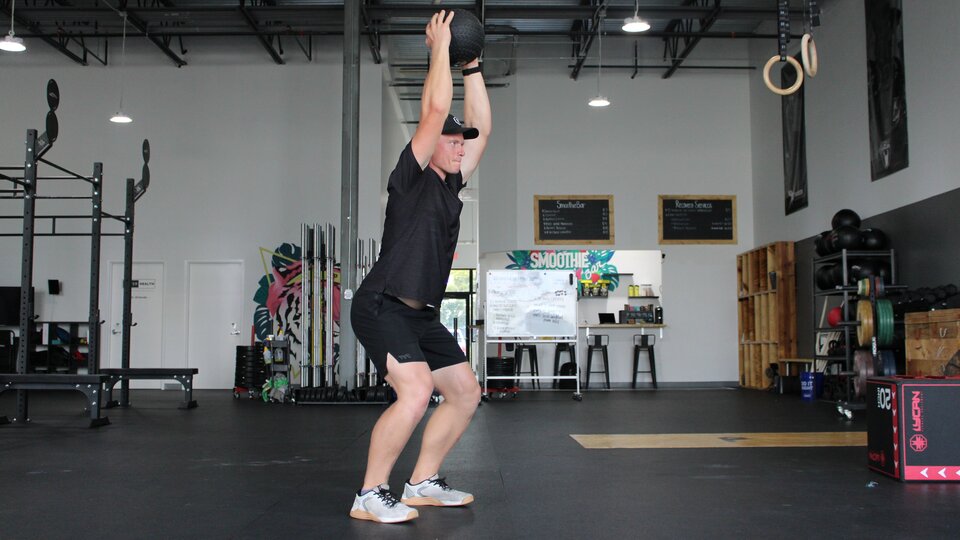
SCROLL DOWN
MIND & BODY

STRENGTH
IN NUMBERS
Gavin Groves takes a closer look at whether weight training for golf is the norm or the exception
This month I am going to introduce a topic that has been fairly prevalent within golfing circles on social media. As golf has transformed into an athlete’s sport, and with the addition of golf at the Olympics, we have seen more professional golfers add weight training to their daily routines.
The reasoning has been quite broad, as some do it to prevent injuries, some do it to add distance and some for longevity of their career, but what we can agree on is that weight training in professional golf has become the norm rather than the exception.
Pioneers like Gary Player, Greg Norman and Tiger Woods were trailblazers in adding weight training to their regimes in their eras, which has helped set the standard for the modern golfers to follow. We have even seen players like Bryson Dechambeau, Tiger and Rory McIlroy all feature on the covers of men’s fitness magazines.
There has been a train of thought where weight training, or resistance work, will “make you too sore” to play, or golfers are resistant to weight training because they don’t want to become “bodybuilders”.
The truth is, weight training, or resistance work, can be extremely beneficial to golfers, with the key phrase being “when applied correctly”. I am going to list some benefits as this is an important topic which I can unpack further in future articles:
1. Resistance training increases strength: Dechambeau made a bold decision a few years ago to increase his strength and muscle mass, which has transformed his game! More muscle means more force production, which can lead to greater clubhead speed and distance.
2. Resistance training builds muscle: As part of point one, with more muscle mass comes strength, and with more strength comes more clubhead speed and distance.
3. Resistance work helps prevent and manage injuries: Muscle is the support structure around the joints and skeleton, so with more muscle comes some more support for those joints, which can reduce the load on areas like the back, and even reduce pain. Justin Rose (below) has been open about using weight training to manage a long-standing back issue.
4. Resistance training is healthy: Our day-to-day occupations have become less physically demanding, so people move around less, losing muscle mass and becoming more unhealthy. Lifting weights has become necessary to offset our inactive occupations.
5. Resistance training changes your body shape: Muscle gives your body shape and also requires more energy to contract and relax, so having more muscle in your body can actually help burn fat!
6. Resistance training is good for bone health and density: Lifting weights creates mechanical stress on the bones through actual load and muscle contractions pulling on the bone. This in turn causes bone remodelling and is a great way to treat bone-density issues like osteoporosis.
7. Weight training is good for kids: This concept has changed over the years, and as we see more kids struggling with inactivity and sedentary lifestyle issues, weight training can be hugely beneficial for them, when correctly supervised.


DID YOU KNOW?
GolfRSA has partnered with The R&A for a year-long journey looking at the benefits of golf, with a highlighted theme each month. September’s #HealthyHabit is Golf is Good for Strength.
Explore the benefits of golf and why you should choose this sport as your #HealthyHabit for life. Research has shown that golf improves many physical and mental aspects including muscular strength, power, endurance and confidence. Golfers also benefit from green space and social interaction.
Join The Golf Mag and GolfRSA on social media and share how golf has been good for your health.
With many more benefits included in the ones mentioned, the big question is, why don’t more people lift weights when they go to gym? Lack of knowledge, intimidation, confidence, previous bad experiences and available time are some of the reasons, but weight training is not necessarily something that has to be done every day. In fact, rest days are needed to allow the body to recover.
The key to incorporating resistance work into your training is having a plan, along with some guidance on how to do it correctly and safely, with the most benefit for you.
Here are a few examples of some of the exercises I use on a day-to-day basis, in my own training or with clients, depending on what our goals are:
https://youtube.com/shorts/QfaAvqejsCM?si=WSoUrJg4v-7o-OAW
https://youtube.com/shorts/KKlI6TpYTcA?si=KDzeeTGJKs_17lAn
https://youtube.com/shorts/UtFV2g9yLdY?si=qpS_J2j2DvrRhj0n
If you have any questions around training or weight training, or would like to know more about it, you can contact me through my website gavingrovestraining.co.za

ABOUT THE AUTHOR
Gavin Groves graduated with honours in biokinetics from the University of Pretoria in 2007, having completed his undergraduate degree in human movement sciences the previous year.
He started working at the World of Golf in 2007 as a golf fitness professional, working with a wide spectrum of golfers, from beginners to elite amateur and professionals. A year later, he started his journey with the Titleist Performance Institute (TPI) and completed all three levels by 2012. He is also an AA-member of the PGA of South Africa.
Gavin joined the University of Pretoria's High Performance golf programme in 2013 with the aim of focusing on elite and performance golf.
In 2018, he moved full time to the DP World Tour, where he has worked with Brandon Stone, Haydn Porteous, Andy Sullivan, Sebastian Heisele, Sean Crocker and Darren Fichardt, among others. He also counts numerous past and present Sunshine Tour professionals as clients.
In a career spanning over 16 years, Gavin has worked with over 50 South African male and female professionals, and continues to grow the fitness aspect of golf internationally and on local soil.
Gavin has been the full-time fitness consultant of the GolfRSA National Squad since 2017 and worked with some of the best South African amateur golfers, including British Amateur winners Jovan Rebula, Aldrich Potgieter and Christo Lamprecht.

@GavinGrovesGolf


IMAGES:ERIK S LESSER/EPA/SUPPLIED/INSTAGRAM/X/PGA OF AMERICA